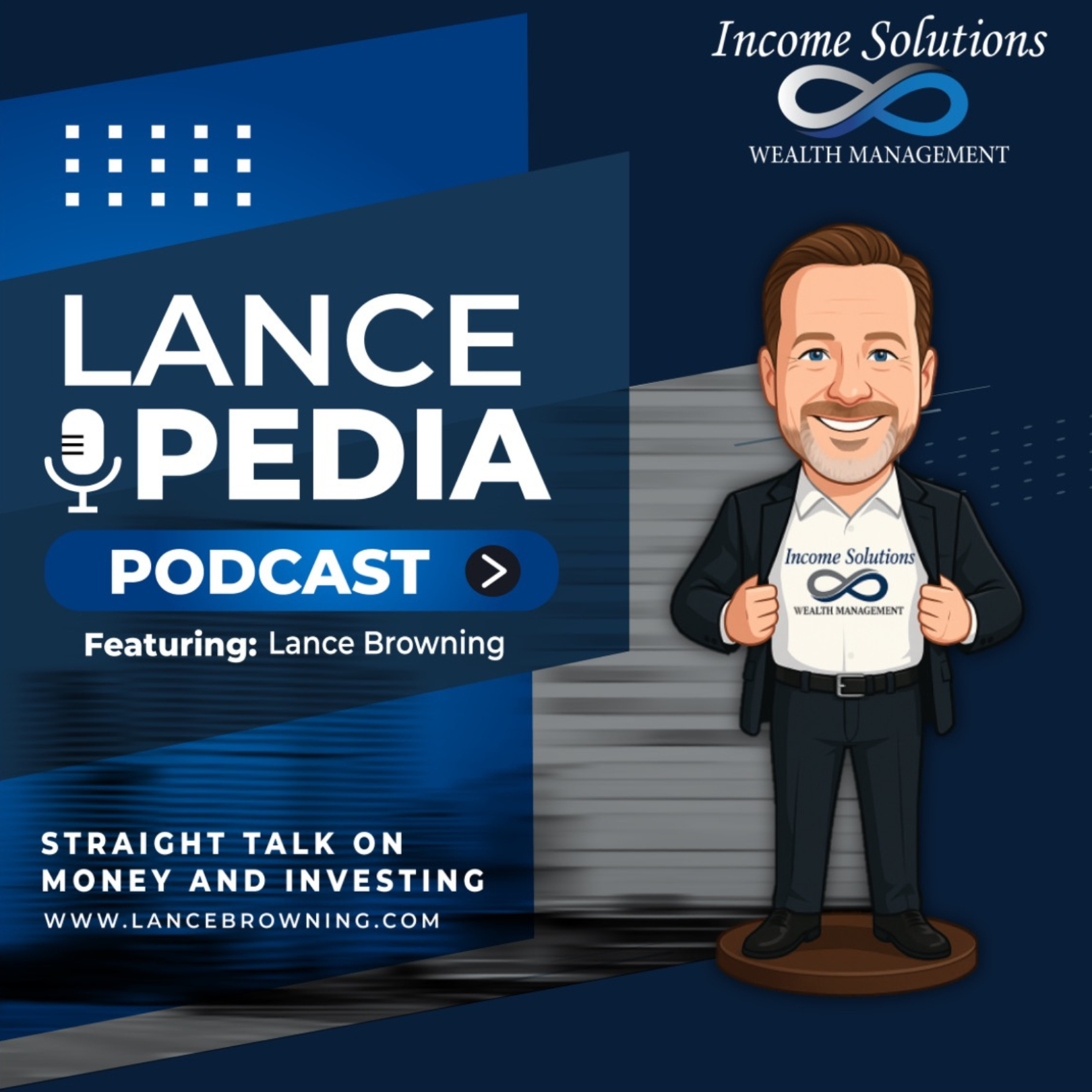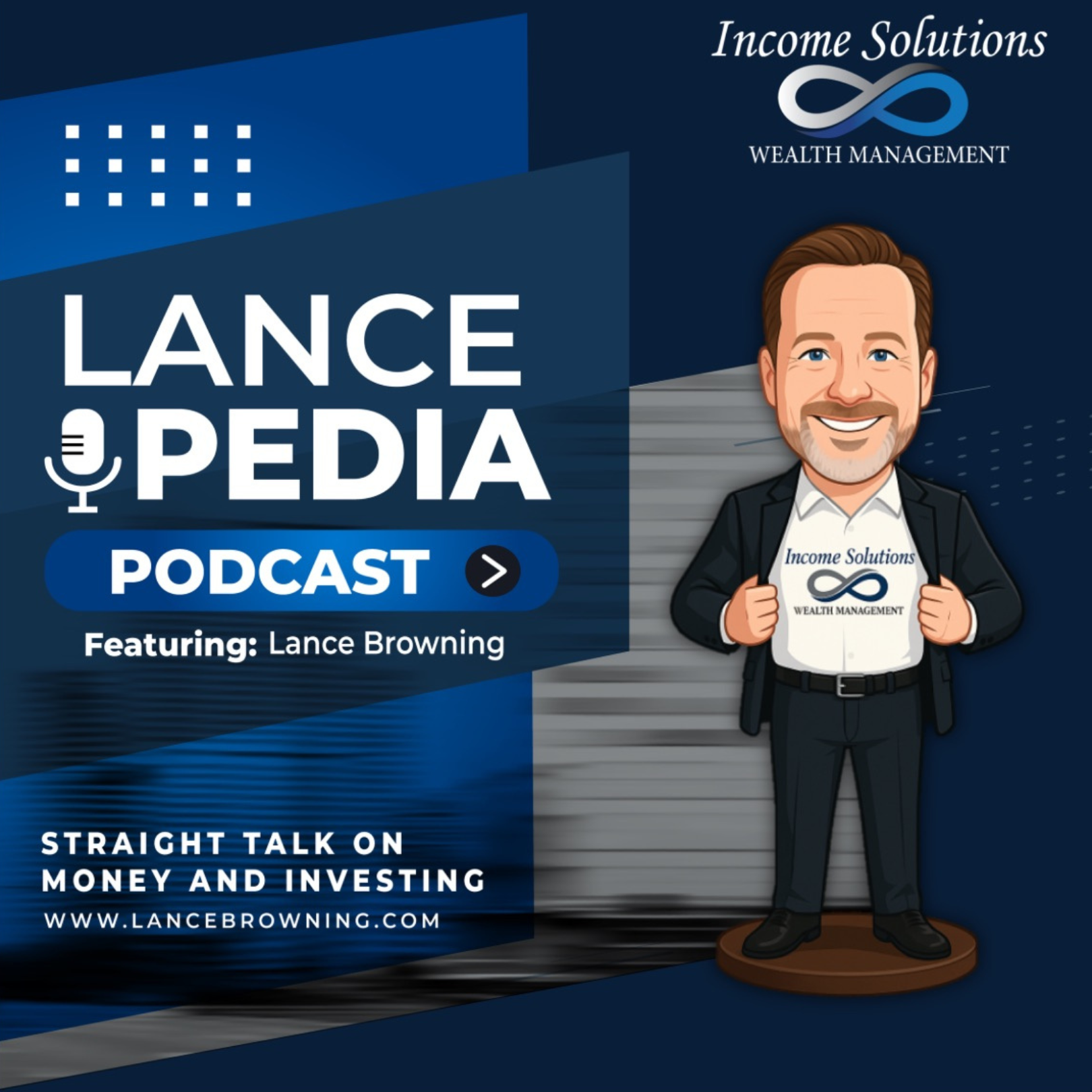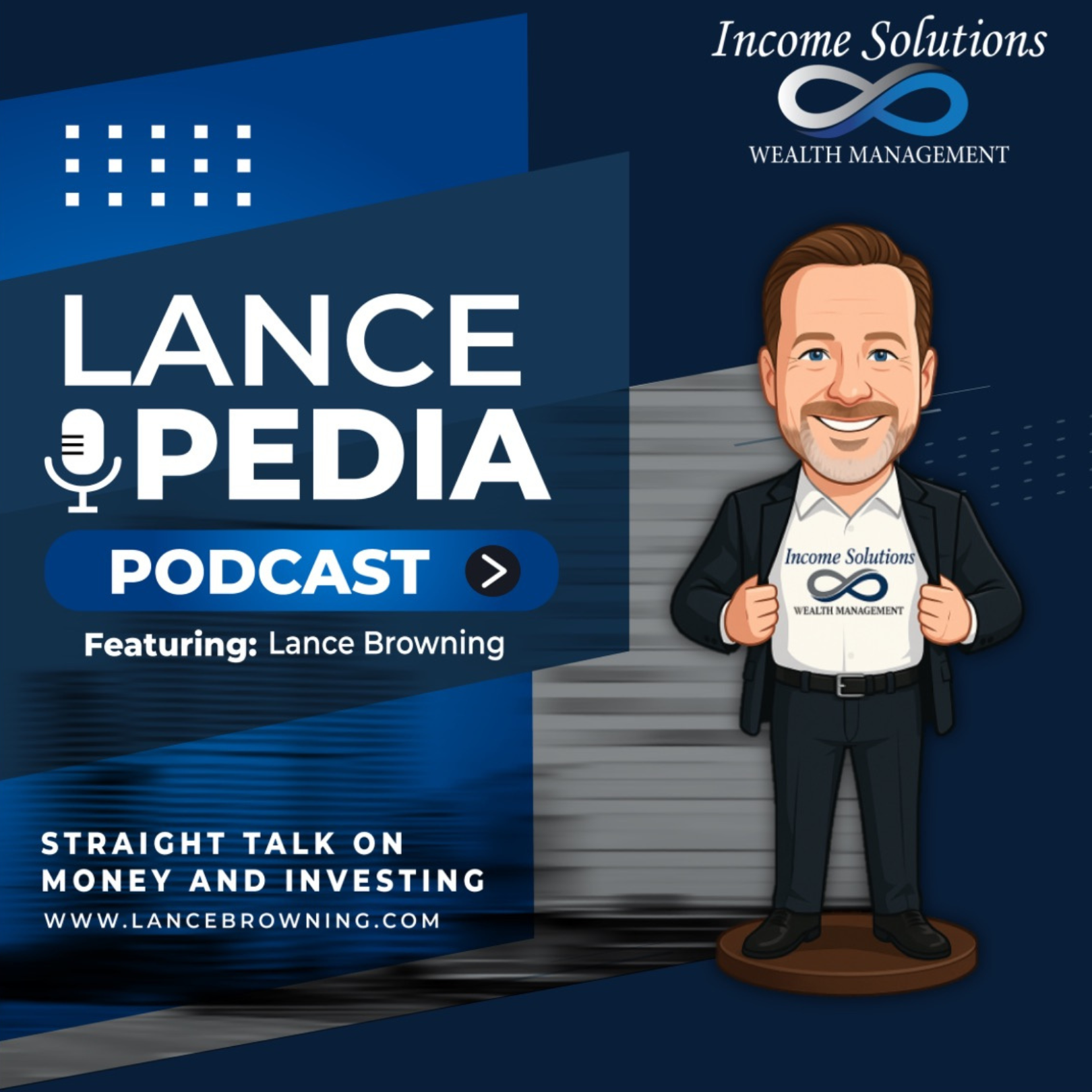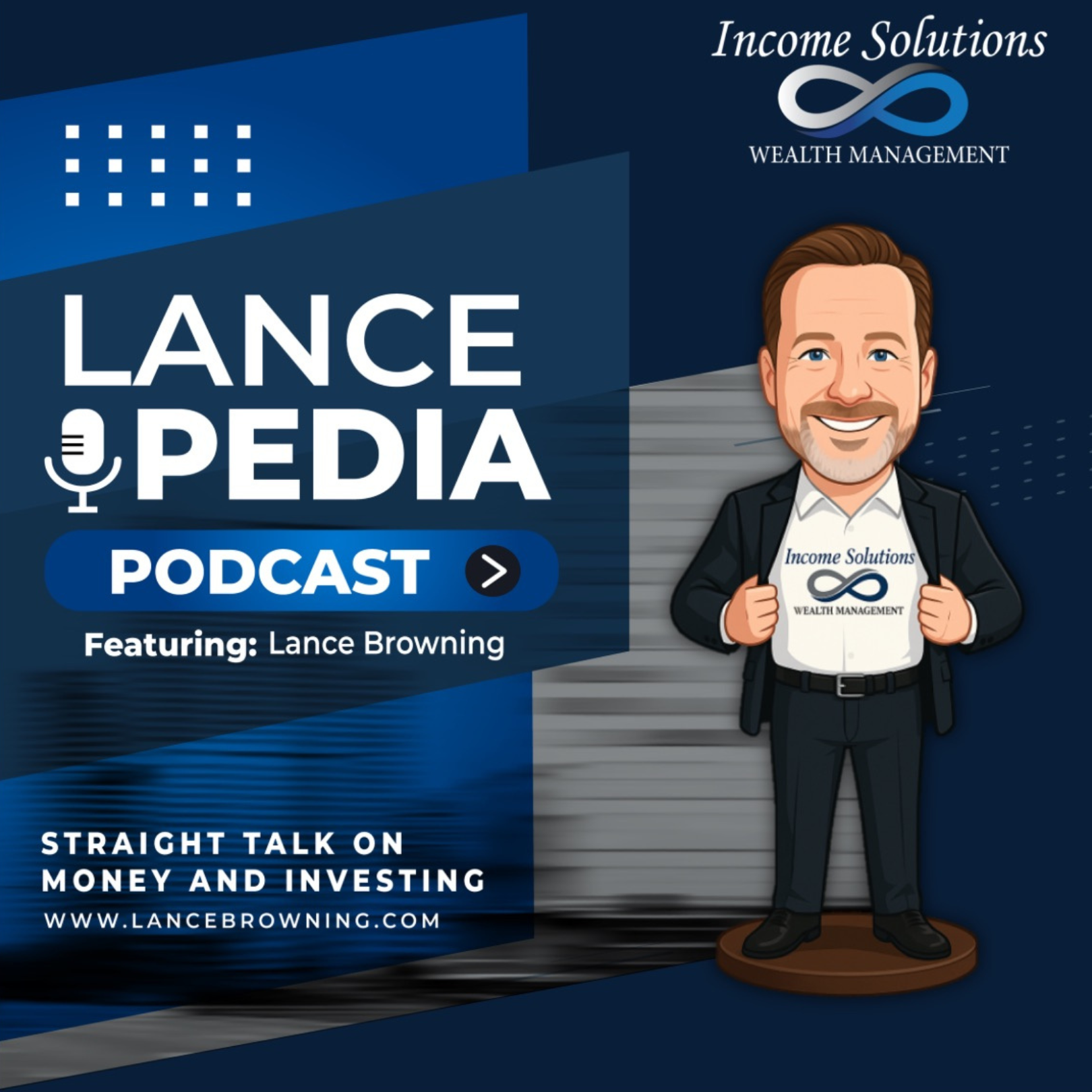Episode Transcript
[00:00:03] Speaker A: It's not about the rate of interest that you're currently short term earning on these very short term instruments. It's really about how much you keep, how much goes in your pocket after taxes, after inflation. That's the key.
[00:00:27] Speaker B: Welcome to Lancepedia Episode 4 featuring Lance Browning. Good to see you as always, man.
You've titled this one Cash or Trash. So this ought to be a lot of fun. I'm looking forward to what we got today.
[00:00:40] Speaker A: Yeah, so you know, we just kind of want to talk about a conversation we're having a lot right now and kind of talk about what's going on with investors right now, Garrett. And I don't care if you're an investor in the stock market, bonds, gold, or an investor in CDs, money markets, short term treasuries, that sort of thing. What we're seeing though is a tremendous amount of complacency on the part of investors. So stock investors are very aggressive right now. You've seen a very aggressive buy the DIPS approach, particularly for retail investors over the last gosh, really five years, honestly. So stock investor, very aggressive right now, but we need to see if that's disk, if that's really connected in reality, really rooted in reality, particularly Fed reality. And so short term cash and CD investors, they're kind of like this guy in the hammock, he's kicked back, he's relaxing, he's earning 4 ish 4 plus percent rates of return on his short term CDs, money market, treasury bills, whatever, while doing absolutely nothing. He's kicked back in the hammock, drinking some lemonade, earning 4%. Last year when we did a similar presentation to this, it was 5 something percent. Now it's 4 something percent.
I strongly suspect after the 17th of this month, Garrett, it's going to be 3 something percent as, as reality kind of sets back in on interest rates as well. So we believe there's a danger in all of that complacency, Garrett, for both stock market investors and short term cash investors. So let's talk about the negative effects of emotion on us as investors. To quote Commandant Oliver Perry, we see the enemy and it is usually us. Right?
We talked about this in our halftime report as well. We talk about this a lot. But you see the average rate of return here in this chart for various investment types. And then we see the average rate of return for the average investor, the person actually doing the investing.
And so real estate investment trusts, this surprised me by the way. Real estate investment trusts, what we call REITs have averaged about 9.8% annually. That's really strong. Stocks, the S and P market has averaged about nine and a half. They've averaged about nine and a half percent a year annually. Okay, so we can also see here international stocks, government bonds, residential real estate.
Sadly, the average investor investing in these investments only made about 3.6% over a year on the same time in, during the same time period. So if you take into account a say 2.3 to 3% rate of inflation, the average investor only netted less than 1%.
If the average investor was working out of a taxable account or having to pull withdrawals out of a retirement account, factoring in taxes, it's even worse than that.
And so emotions are kryptonite for us as investors. The average investor. You know how I hate the term average return. We've talked about that. The average investor is notorious for doing the exact wrong thing at the exact wrong time. They get greedy, they buy high, they get scared and they sell low. And we just keep repeating the process with bad results. That's very, very common.
Very, very historically true. And so.
And disclosure disclaimer, right. I am not a psychologist. I don't play one on tv. I always say I'm not an attorney either and I don't play one on tv. But that said, I'm pretty adept, I feel like, at what we call what we term behavioral finance. In other words, what thought processes make investors behave and do what they do.
Many of you have heard me say, and I even mentioned this in my talk about this in my book, Dr. Phil's got nothing on me. OK?
I've seen a lot of this over the years and so kind of going into Dr. Phil mode, right? So let's talk about some of the biases in our brains that can really hurt us as investors. So one is going to be called hindsight bias. Hindsight bias. Hindsight bias is a tendency to perceive past events as more predictable than they actually were. Due to this, people think that their judgment is better than it actually is.
This can lead them to take on unnecessary risk or even to judge others too harshly sometimes on an interpersonal level.
Next is what's known as anchoring bias. This will get you. Anchoring bias refers to people's tendency to give disproportionate weight to the very first piece of information they receive in that decision making process.
So as a result, this becomes a reference point or anchor that influences people's perception of subsequent information. They're going everything through the filter of that initial anchor Point. In other words, their brain gets stuck on something and they refuse to let it go. Right. When your kids want ice cream, same kind of thing, Right.
So lastly, we'll talk about confirmation or cognitive bias. We kind of use those terms interchangeably. This is a tendency in people to favor information that confirms or strengthens their beliefs or values. Politicians are magnificent at exploiting this bias for their own political gain.
And once that information is there and has been confirmed because we wanted it to confirm, it's really difficult to dislodge once that's been affirmed by information we've sought out. So basically, cognitive or confirmation bias, they cause us to only see and hear what agrees with us and our beliefs. Big problem as investors. We showed you this in the halftime report. We generally show this every year in our halftime reports, but I think it bears repeating. So this is going to be from last year and I don't think the information is that different, honestly. The scope, the dollars may change a little bit, but not much. So this really shows us a complacency on the part of short term cash investors. What I lovingly refer to as the lazy money.
So back to our second slide. The average cash investor sitting there earning say 4% without taking any risks or doing anything. That's what I call the lazy money. When I did this same presentation similar last year, Garrett, that number was 5%. Now it's four and it's about to be three, we believe. All right, so these investors, man, they're laying their hammocks. They don't care in the world. Life is good. The problem is their own biases are giving them what I believe is a false sense of security and keeping them in some very flawed thinking.
And we'll talk more about this in just a second. But what this slide's showing is there's about 19.3 trillion. That's with a t trillion dollars sitting in short term cash, treasury bonds, CDs, cash equivalents. This is a lot of money sitting there, really. It's uncommitted and quite honestly, in my opinion, very unproductively invested if we want to call it that. It's very unproductive right now with that capital. We talked and we. You'll love and know this slide from many of our past reports, including, you know, episode three, halftime report. This is called the treasury yield curve. So many of you going to remember this that the yield curve is one of our big four economic indicators. What you see here are different maturities of treasury bills, notes, bonds, short term stuff ranging from one month all the way out to 30 years. So broad spectrum. What you see going on the left are interest rates or yields that each note with each maturity is paying. And so common sense tells us that the longer we tie our money up, the higher rate of return we're going to get. Makes sense. That's not where we've been. That has just. The ship has just kind of righted itself, but that's not where we've been for. For quite a while. So this is what is known as an inverted yield curve. In other words, short term interest rates have been at least they're not anymore, but have been higher than long term interest rates. So that charts look like this in East Texas, we refer to this as bass ackwards. Right. I'm sure there's a. Garrett, I'm sure there's a North Carolina version of that in some sort. I don't know that we can repeat it on the podcast. But given that short term rates, short term rates directly affect CDs and money markets, these are substantially higher have been than long term rates. It shouldn't be any surprise that investors, investors prefer to buy short term stuff, particularly if they're being rewarded. By the way, inverted yield curves historically typically have preceded recessions. So far we sort of dodged that bullet.
I wanted to spell some myths here, Garrett. There's a tremendous amount of historical correlation between what the Federal Reserve does with interest rates and inflation. So your blue line here is the fed funds rate, all right? So that is pretty much directly controlled by the Federal Reserve. So when they meet on the 17th, they're going to be talking about the overnight rate, the fed funds rate, those sorts of things. Okay? So the yellow line is going to be inflation. So notice a couple of things. So first, when, when these two lines they're going to track correlate very tightly. And when both of these lines get relatively high, a recession typically will follow. So we highlighted those points here. We with the red arrows and then those gray bars again, you'll see a theme, recurring theme. Those gray bars that run up and down vertically, those are recessions. So you see red arrow, recession, red arrow recession, red arrow. So you see kind of the path of that and how that works. So long story short, when rates and inflation both get pretty high, a recession very typically will follow. When we have recessions, the Fed cuts interest rates and those rates go back down. That's just cycle, cycle. I would encourage you to go back and watch some of our reports this year. By the way, subscribe to our YouTube channel in search of a recession funnel with the Fed. We're gonna talk funnel with the Fed here later on next month. And our halftime reports. So in all these, we try to make a pretty compelling case that at least a mild recession may be imminent. And you kind of see why that was.
And the biggest point I wanna make here is that investors are not gonna be able to just sit around in short term cash money market CDs in that hammock indefinitely. We believe that we saw peak, quote, unquote, peak rates right about August of 2023, or, excuse me, late 2024. We believe we saw peak rates and there have been chances and talk that the Fed would raise rates from there. We haven't seen that. We actually think the opposites going to happen. But if we were right, and this is actually the case, interest rates are going to be coming down. I think that's the reality. And short term, that short term investor sitting there in their hammock maybe in for a pretty rude awakening when these very short term rates, cash, CDs, money markets start to roll over at lower rates. We call this, Gary, you know, this reinvestment risk. Well, Lance, I'm in a money market, I'm in CDs, I have no risk. Well, yeah, you do because whatever rate you have and because you invested short term, because short term rates were higher than long term rates were inverted. Makes sense. So I was invested for short term. When that thing matured, that short term instrument matured, I reinvested at a lower rate. And you're seeing that stair step kind of coming on down. I think reinvestment risk, we've seen it. I think more of that is coming. And these short term, complacent, relaxed, kind of what I call lazy money investors, they're not gonna like how this turns out. I, I don't think this is gonna have a particularly happy ending for them. But. And I know, I get this, I've been doing this quite a long time. I know many of you have told us that you're afraid to buy green bananas. The old joke, right? I don't buy green bananas cause I'm gonna die before they turn right. Right. And we're terrified, we're scared to death to, you know, gasp, tie our money up. I get it. I've been doing this a while. I get it. But we should show you some very good reasons why you might want to reconsider some of that thinking. We're not saying don't have any money in short term cash, don't have emergency funds, not remotely what we're saying here, Garrett, but consider why we're sitting in cash and the rationale behind that. It may be if we have some biases maybe that are going to going to bite us later on. Okay?
And before we close, we want to make these numbers as real as possible. So my 50 next month, 56 year old is. I'm a 69 model, Garrett, before those kick in, so I can keep my notes and my charts together here.
We want to make these numbers what we've been talking about, as real as possible. So problem is, here's the thing. It's not about the rate of interest that you're currently short term earning on these very short term instruments. It's really about how much you keep, how much goes in your pocket after taxes, after inflation. That's the key. And you see here on this chart the real, what we call the real rate of return on CDs. You can see the years going up and down the far left. Those are calendar years. All right.
The next column shows us the average 6 month CD rate for that given calendar years, that calendar year. That number now, by the way.
Well, when we did this last year was about five and a quarter percent. That number now is four ish percent.
All right, about five and a quarter last, last year this time. The third column is a dreaded T word, right? Death and taxes.
And if these money markets or CDs are held in a taxable account or if you've got to pull them out of an IRA eventually, remember we got to render unto Caesar, right? Got to pay your taxes.
And as they say on the TV infomercials, you've always seen them, you know. But wait, there's more.
Don't forget about inflation. That's key. As we just showed you, interest rates are relatively high because inflation has been relatively high. It's coming down. But on the very far right, you see that these quote unquote safe investments, what they actually net into the pocket for that investor. We're going to fast forward all the way to August of 2023 and let's say that our CD was paying five and a quarter percent. Right? Now I would say that's four low fours.
And of course, with our biases, the way God wired our brains, we believe that interest rates are going to stay this high, this long for eternity, right? That's what's in our brain. And so whether this is in a taxable account or a tax Deferred, like an IRA, 401k, whatever, taxes are going to eventually have to be Paid, you got to render unto Caesar here. And so let's say we were making five and a quarter then maybe 4% now on a short term CD, whatever, right? Let's say we're in a 22% marginal federal income tax bracket. And please note, it could actually be worse depending on the state that you're in. No state income tax in the great state of Texas. But they do find other ways to stick it to us. So If I take 22% federal again taxes out of this CD, I wind up with about 4.1 on a five and a quarter I wind up with about 4.0%.
You can knock that down probably you're a little shy of 3% in current world, in current environment here. But wait, there's more, right? We've still got to take out current inflation.
Historically it's about 3%. Right now it's bumping about 2%. So if I start subtracting taxes, inflation of these numbers, I'm going to walk away with something 1% or lower right net in my pocket. So while these relatively high short term rates, they give us these warm fuzzy feelings. But we can, I think we can make the case that it's, it's probably going to wind up being a false sense of security. I think we're going to wind up going broke very safely if we're not careful there. Leaving you on a lighter note here. We want to make the case that your short term cash may actually wind up how that may wind up actually being trash.
Each year we put on, it's our biggest event. We put on our annual classic car show here at Income Solutions in Tyler. These are by far, far and away our biggest event of the year. They're, they're a blast. You need to come to Tyler sometime. It's usually second Saturday in April. Garrett. We'll, we'll make reservations at Browning Bed and Breakfast, man, come out, hang out with the cars. But and on the list of everybody's favorite classic car, of course is the fabulous Ford Mustang.
So let's go back to four different calendar years here and see what happened. And in these years, Garrett, we're going to invest $100,000 in a six month CD.
So you can see the model years on the far left. The next column on the right shows the rate of inflation key for that year. The third column going right shows us how much income we would have gotten for that year investing in short term 6 month CDs.
Now the next column to the right shows us the sticker price of a Ford Mustang in that calendar year. So in 1964, a new Ford Mustang would have cost you a little over 2,300 bucks. Right.
Go try to buy one of those bad boys at my car show nowadays. Pretty good ROI on that. Right? But, you know, the good old days, right? But a 2023 Mustang, and I assume this is a very, very base model, would run you almost 28,000 doll.
The last column with the picture really, I think, tells the story here, but. So in 1964, you would have earned enough money on your CDs to buy probably close to his or her. His and her Mustangs. You could have bought about two of them. In 1984, you could have gotten a new Mustang and a whole bunch of gasoline. Right. In 2004, you would have earned enough to really just soup up your car exhaust and engine kits and all these things. So today you might. Might be able to pull off a hood for a Mustang.
I can't say it any better than that, Garrett. Yeah.
[00:19:09] Speaker B: So you're going from two cars to one hood?
[00:19:14] Speaker A: Yep. Yeah. Yep. Pretty much. Yep.
[00:19:16] Speaker B: Wow, that's. That may be the. The best illustration I've ever seen of inflation. Honestly, Lance, well done on that. So for. For listeners, viewers out there, if you would like to. To reach out to Lance, I'm sure he would be more than happy to chat with you. If you have question, personal financial situation, I also want to encourage you to check out Lance's YouTube channel. In addition to the Wealth Partners network here where we host the podcast, he also has his own YouTube channel as well, which is YouTube IncomeSolutions WealthMGT. Not quite the full management, but mgt. So again, that's YouTube Comesolutions WealthMGT. You can check out Lance's full library of videos and other podcasts and other communications and education material he's put out there. We'll also link that below. So if you didn't catch all of that, don't worry about it. If you're riding in your car, listen to the podcast. Don't pull over. Just when you get a chance, you can go back and the link to that will be in the description as well as a link to Lance's website.
But if you do have a pen and paper and want to write it down. Lance, why don't you tell the folks where they can reach you and the best ways to contact you?
[00:20:22] Speaker A: Absolutely, Garrett. We were just too cheap to do the whole description on the YouTube thing, so sorry about that. But they charged by the letter. They're exactly right. It's too cheap. Too cheap to pull that one off, but yeah. And please, if you're driving and listening, please don't pull over.
I do not recommend that in Tyler, Texas. Okay. But we can be reached. We're here on the. In Central Command, here on Troop highway, what I call troop. Troop calm.
That's going to be 3200 Troop Highway, Suite 150, Tyler. You can reach us at 9037-8789-1690-3787-8916 or www.lancebrrowning.com is our website.
[00:21:02] Speaker B: That was an original website right there. How'd you come up with that one?
[00:21:05] Speaker A: That's five years of college. That's marketing degree, man. Talk about the University of Texas, bud.
[00:21:10] Speaker B: Good thing about that one is I bet you didn't have to worry about that domain being taken.
[00:21:13] Speaker A: Yes, sir. Correct.
Or me messing it up. Yeah, that's right. Yeah.
[00:21:18] Speaker B: At least you know how to spell it.
Always a pleasure, brother. Good to see you, man.
[00:21:23] Speaker A: We'll.
[00:21:23] Speaker B: We'll see you next time. And for listeners, viewers out there, appreciate your time and we'll see you.
Real thanks so much, man.
[00:21:29] Speaker A: Appreciate it.
[00:21:30] Speaker B: See you, Lance.
[00:21:31] Speaker A: Bye. Bye. Bye.
[00:21:33] Speaker B: Lancepedia is for entertainment and educational purposes only. The views and opinions expressed in this show are that of Lance Browning and are not guaranteed to come to fruition. If you have questions about your investments or your financial plans, you should seek a financial professional or give Lance a call at 903-787-8916. We thank you again for watching or listening to the podcast and we'll see you next time.



